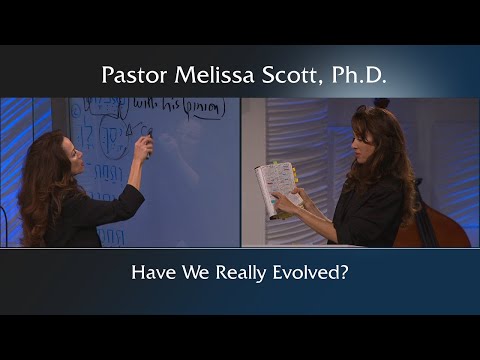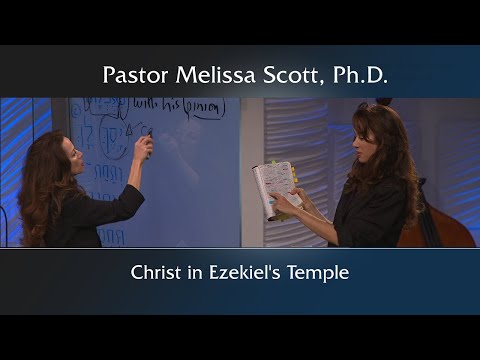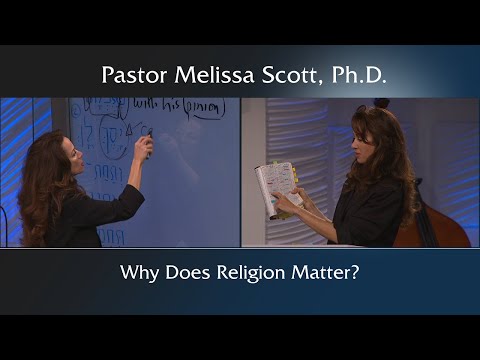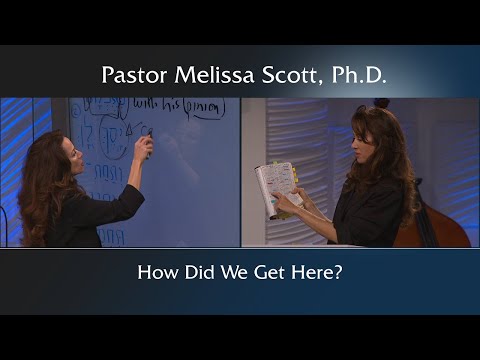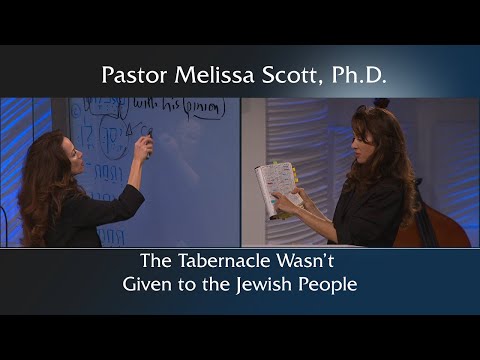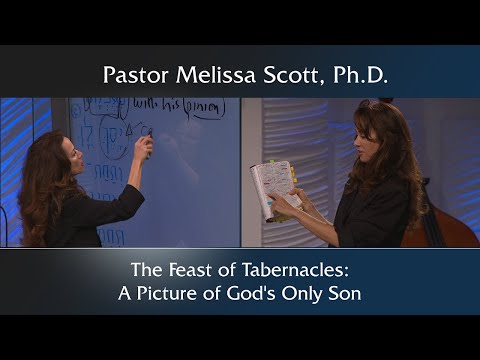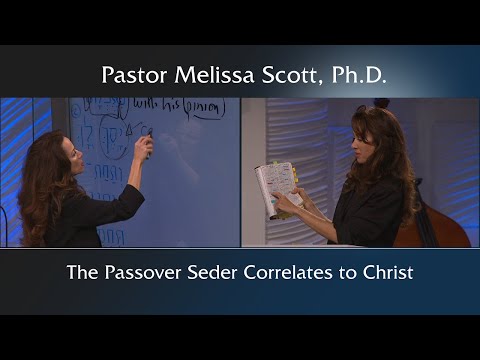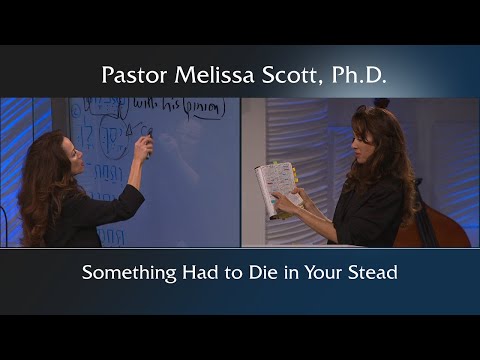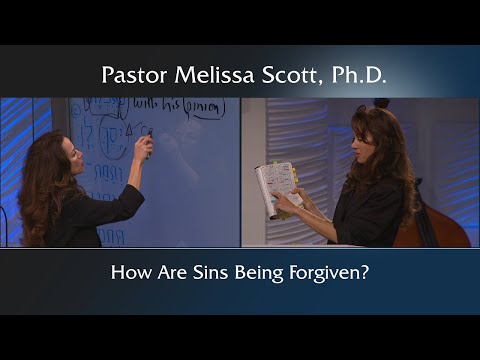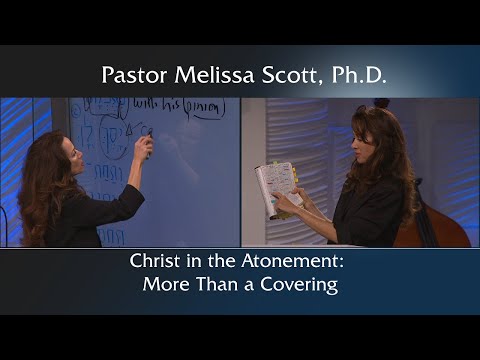The worship practices that God prescribed are not being practiced anymore and modifications have crept in like “God doesn’t want our sacrifice anymore, but acts of lovingkindness,” which I’m sorry to say – acts of lovingkindness cannot cleanse the soul. They cannot take away sin. They can make you a better human being, but that’s about it. And I’m sorry to say it like that, but; and you could say, “Well, that’s, that’s kind of crazy. Why would you say that?” Well, I’m saying that because we’re looking at God’s word. And God’s word has another problem here. And do you want to know what the problem is? Leviticus 17, it is the blood that makes an atonement for your soul. So if you remove all the blood, how is your soul being atoned for? You’re either performing the sacrifices of old, or you’re looking to the final sacrifice: Christ.♪ ♪ ♪ The Day of Atonement is the English for what is called Yom Kippur. In the Hebrew Old Testament, the word Yom, “day” in Hebrew, and Kippur is from the Hebrew word kâphar, “to cover,” carrying the concept of the day as covering or atoning for the past year’s sins. Now, I want to just take a second here and I’ll probably drive some people crazy with this, but you’ll hear me say this to the close of the message, where this system failed; not God, the system, is you begin to see that the children of Israel did not fully trust God, they didn’t fully follow God, even, trust me, when you get to the book of Malachi it becomes apparent that God had had enough. We’re talking about first and foremost, the priests who were just doing everything under the sun, the opposite of what God prescribed, and then you’ve got the people who are rebellious, stiff-necked, they think they know better than God, and some point, you get an awareness that where the system failed; not God, is people need more than a covering.You need more than a covering for the year’s past sins. And that opens up a floodgate of theological questions which I won’t get into now, but I’m just, I want to say this at the end of the message. If you didn’t know the Old Testament from the New, what would you rather have? Are your sins covered for a year, or are your sins taken away permanently? It’s a no-brainer, right? (Yes ma’am.) So this is where when you read the book of Hebrews, it starts with telling you how much better Christ is, how superior the New Testament, how superior; it’s because it’s referencing these things that are very difficult to articulate in their conceptual meaning, but when you see it on the pages, it’s clear as day. So the people were following this prescribed, or these prescribed set times, Yom Kippur, for example, occurs on the tenth day of Tishri, which would be the seventh Hebrew month, which is the equivalent to our September/October, observed after the Feasts of Trumpets, but before the Feast of Tabernacles.This day was supposed to be very solemn, and there’s a passage that describes the day. The Lord said would be a day when you shall afflict your souls. And we can understand what that means. “Afflicting your soul” would be abstaining from food, so fasting and repenting. So that whole day was emblematic of cutting off, essentially when it says afflict your souls, cutting off all of what you would normally do, including work. If any person chose to work on the Day of Atonement, the Bible says it at least three times, if you worked on the Day of Atonement, how solemn it was, and how important it was for God, if you even tried to work, you’d die. You’d say, “Huh?” Yeah. That’s, and it’s in the Bible, so you can look it up. This day also marked another peculiarity, which is the high priest was permitted to enter into the Holy of Holies and stand before God, which was not done as we think sometimes, “Oh, the priest did this regularly.” No, he did not.Wearing his holy garments, special holy garments for that particular day, not his usual but still festive robes, these garments were only worn on this day, only, to ensure that the high priest did not make himself ceremonially- unclean there are all these minute details. Now, I’m talking more about temple times than Tabernacle. We have more details as you go into the book.So I may be combining things from the Tabernacle and the temple, but this would be more towards temple time. If the priest, high priest became ceremonially unclean himself; coming in contact with a dead body and not cleansing, or there was a whole list of things that could make someone ceremonially- a high priest ceremonially unclean, it would disqualify him from performing his tasks. The high priest would stay in the high priest’s quarters inside the temple. So obviously, this is during the temple times, they had a quarter, an area just for the high priest. And it’s kind of interesting because there’s also a backup to the high priest in case he couldn’t fulfill his duties. There are all kinds of details that God was saying, “Hey look, I’m going to think of everything here,” and I think He did, covered it all, backups to backups with the course of the 24 ministers standing by, everybody’s watching. All these things ritualistically must be carried out. For example, for the high priest, it would be the sprinkling of the ashes of a red heifer, twice before his required duties were to be fulfilled.Now, if you’re one of these people who studies eschatology and what’s going to happen in the future, that’s the whole big fuss about, you know, there, there are people in this day, and this has been going on for a long time, that is looking for that particular red heifer to make sure that that particular red heifer has no blemish, that fits the criteria. But guess what? That red heifer that they chose 10 years ago, it ain’t so red heifer anymore, right? So there’s a whole group of people out there doing different things in preparation for the end, but even if the end were to start today, you probably still need to see, the Lord will provide that when the time comes.I love that people want to be prepared. Some people are trying to build the temple now, they’re trying to build the tools, the utensils, and everything, but when the time comes, God will pull the switch, and there’ll be people who will be driven to do these things, to bring to fulfillment what God has revealed in His word. Now, for the ritual cleansing, if you want to read about this, I don’t have time to do this now, but if you want to read about the ritual cleansing, there are many passages including Numbers 19. They are the basic required cleansing for ceremonial defilement and cleansing.Now, as I said, there would also be a backup priest, usually the next in line in succession, standing by to fill in case the high priest himself could not accomplish or perform his duties. And this person would be referred to as the “captain of the temple,” just all these little neat names. And then when you go in to read the New Testament, you might find some of these names and not know what exactly they mean. So the captain of the temple would be the backup person. By the time of the temple, where we see very clear developments of patterns of worship, we see that the ashes from the altar were removed and four fires were lit instead of the usual three.There are a lot of activities here that you just say, “Wow, for one day?” Yes, and on this unusual day, and I say unusual because it is the special practices and activities that go on this day that are radically different from everything else. The priest would go about washing his hands before carrying out his duties, but on this day the priest would also be required to be immersed and cleansed in a large tub or bath. Now there’s great debate about this because you’ll hear me say, you’ll hear me repeat this somewhere else, but it seems like when they were getting ready when they were preparing the high priest, a lot of things were done behind a curtain of linen so that people who wanted to make sure that these things were being carried out could see the shadow of what was happening behind the curtain.That’s a little freaky; I’m going to tell you, okay? I don’t even know what to say about that, but anyway, so would you like to have 50 people watch you bathe? I don’t think so, okay? And that’s just one of the weird oddities, like, “Thanks, but no, thanks.” So the oddity of all this cleansing for the high priest, as I said, was carried out behind a curtain so that it’s not because people were perverts or weirdoes; it was if one thing was omitted, it could ruin the whole day and that whole day, just not being ruined, but God’s wrath could be poured out. So it was important to do every jot and title of what was required to the best of their abilities, which they did.The priest would then wear a special attire for this day, perhaps most noteworthy were the ornaments that would be at the hem of his garment down by his feet. This was designed so that the people could hear the priest’s movement. And when I say that, because he would enter into the Holy of Holies, this was to make sure that if they heard the noise from the hem of his garment, they knew the priest was still alive, he did not die. Why? Because the Bible clearly says that anybody who sees God, could die, but also if you didn’t carry this out in an exact way. Everything is very precarious here. His special robe and on top of his special robe, he did wear the breastplate with the twelve names of the tribes of Israel, which we kind briefly went through. The priest would wash his hands and feet to carry out the daily, regularly occurring service. Now this is what’s interesting.The high priest would change his clothes five times on the Day of Atonement. Now not, I’m not focusing on the number, I’m just saying, if you know why, then it makes sense. There was a lot of blood being sprinkled and splattered everywhere. So it would make sense. I mean, tell the truth. Would you want to encounter the high priest all decked out with a little spattering of blood here and there? No. And if you didn’t change your clothes, I think you’d probably be covered. You’d be wearing a red outfit, not a white one. So it’s all these little things you’ve got to take into consideration. With each change of clothes, the priest would also have to wash his hands and feet. The high priest’s work began early in the day, and by the afternoon the singular focus would be on the Day of Atonement. There would be a sin offering for the high priest and the entire priesthood, one offering of a young bull. This portion of the ritual took place close to the area where the priest ministered, and that’s also important. God didn’t say do it outside or do it over there, but where they ministered.So if anyone had sinned, this would be the blanket covering for the high priest and all the priesthood. The high priest would place his hands on the head of the sacrifice; both hands and we’ve looked at this concept before, vicarious, communicating all the confession of sins onto the animal, to confess one’s sins to the animal. So the high priest was then taken by two other priests to the eastern side of the altar. These two goats stood side by side, so identical in color and size.Two stones or lots would be cast, and each stone had an inscription. One stone said for Yahweh, and the other one said Azazel on it. But the two goats were considered one in their offering. And it’s kind of interesting because the two goats faced the temple and awaited their fate for the goat to be determined which lot would fall on which goat, and then they would get to work, and I’ll tell you about that in a second. But let me discuss the word Azazel for a minute because we know Yahweh’s name is Lord. But Azazel, most have taken it to mean Satan or some form of demonic representation. If you look it up, however, the etymology of the word is highly disputed. So, and I’m not going to tell you, I know the principle, but I’m not going to tell you definitively, although these speak generic enough for us to understand something.So, it is either a verb, azaz, which is from us, “to be strong,” or el, “God,” which I reject. And I’m telling you why I reject it. I don’t think that knowing the nature of what they were doing with this goat and what its fate would be, I do not believe that it represents that. Or, ez, which is another strength word, and “she-goat”; I’m sorry, ez, “she-goat,” and azel, “to go away.” But commonly translated, specifically in the book of Enoch, you can take the meaning as “scapegoat,” all right? The Oxford Companion to the Bible says, “Azazel is a fallen angel.” And in the Midrash, they say, “demon.” All I would care for you to know is because that goat, that the lot fell on it, and it was named Azazel, it would have a red cord tied around one of its horns, and that basically, they would, again, do this transference of every confession laid on it, and it would be essentially let out, kind of interesting, outside of the epicenter of worship, and the people remained behind waiting for the priest that was chosen for this task to say, “It is done.” At that time the priest would finish the task by offering both the other goat and the bull, but they had to wait for the first to come back and say, “It is done.” The high priest would recite passages from the Torah, specifically Leviticus, and Numbers, to ensure that every prescribed situation was carried out in the ears of the people, mind you.That was the whole premise of this. The remaining offerings on Yom Kippur would be carried out at this time, and the final offerings would not be sin offerings, but they would be burnt offerings. And if you remember, I taught that. Those are wholly ascended and offered to God. There is no sin or trespass attached, just something that should be acceptable and pleasing to the Lord. But now let me take a few steps back to address the sprinkling of the blood within the Holy of Holies. I think I missed something here, and I did. Let me go back to the goat for a second.So originally, if you read in the inception of these instructions, the goat was merely led out to wander, and that was that never to return. But what is not said here, you will not find it anywhere in this book, but I think it can be deduced from this, is I think at some point in one of these annual celebrations or a high day, one of these goats had to return. And the reason why I say that is because during temple times, there was a switch from just merely leading it out and letting it wander and hopefully never to be seen again, that was the idea, versus what developed at a later time where the priest who was assigned to this duty would push the goat backward off of a high crag or a cliff to its death to ensure that it did not return.God, by the way, never prescribed that. See, these are the subtle things in here. These people are worried about the goat coming back. Well, it did one time, perhaps. I’m speculating on this. I don’t know why you would change what God said into something more brutal. I mean, we have enough sacrificing and blood being spilled. Why more, right? Unless you’re into that type of thing maybe, but anyway, that takes care of that.Now, let me go forward to address the sprinkling of the blood within the Holy of Holies. After the bull’s blood filled the golden bowl, the high priest would bring the blood-filled bowl into the Holy of Holies. The blood was carefully sprinkled before the Ark of the Covenant as God instructed. Now, the high priest would sprinkle one time with an upward motion and seven times with a downward motion, almost like a whipping motion. That’s how the blood would be applied. It wasn’t gentle. It wasn’t, it was kind of an aggressive type of sprinkling if you want to call it that. And during this time, while the priest was engaged in the sprinkling, anyone standing maybe in the Holy Place or the other court would hear the high priest counting the number of times he sprinkled, as to not sprinkle one time too many, or not enough. You can see how this is a very box-checking scenario. And I’m not; I don’t want to paint this in a negative light. I think if I was charged to do something back then and God said, “And see to it that you do it exactly like this,” I’d be like, “Okay,” because I know what the consequences are, right? So I don’t blame them for this type of legalism, but that’s what would go on.There he would slaughter, well, he would, he would come out from there and he would slaughter the goat that was determined to be for the Lord, collect the blood, and once more enter into the Holy of Holies with the goat’s blood sprinkling the same way as the first animal’s blood. So you’ve got, you’ve got a couple of times, several times throughout this particular day where the high priest will go in and out of the Holy of Holies. It’s very interesting, because if you think about it, you know, the thinking person would say, “Save time, do it all at once, go in there, do it one time so you don’t risk,” but this is the prescribed method that God said. So the blood of the goat that remained, along with the remaining bull’s blood, was placed in a single bowl and sprinkled on the horns of the altar. Another step in this ceremony was the burning of incense. Now all of this is like minute details, but they all culminate in something which I will get to.Because we’ve studied a very generic overview of these acts, I’m going to try and paint a visual picture a little bit better to try and help us understand the nature and the proportion of these offerings. So the high priest would take a golden censer or a pan, and he’d fill it with live coals from atop the altar. Then he would take two handfuls of the incense.Remember we looked at some of these things, particularly the incense. He’d take two handfuls of the incense and place them in the golden ladle- this is another tool inside the tabernacle or the temple- and carried the fire censer with the live coals in one hand and the incense in the other. He would make his way into the holy place, the area we previously looked at, where the lampstands, the table, all of that stuff, but then he’d make his way through the veil into the Holy of Holies with that. Once inside he would stand quietly and then he would pour the incense on top of the coals and wait for the fragrant cloud to fill the room before exiting. Now you start to put these pieces together and you recognize that alone all these things are oddities, but put together you can see some reason, if you will, of why. The blood, which is always synonymous with life, atonement, death, and the cloud, if you will, the fragrant aroma ascending to God; all of these symbolize, we are basically, “We’re carrying out everything You’ve prescribed, God; what You’ve asked us to do, we’re doing it.” So it seems like a lot of steps, they all kind of in the big picture, if you look at all this you realize this is all pictures and types of Christ; I’ve said this before, I’ll keep saying it.We do know that at every stage from the Tabernacle to the temple, the glory of God referred to as the Shekinah glory would, would fill the Holy of Holies, everything done right, kind of what I like to say is God’s seal of approval, like, “Okay, you did it well, everything was done to My standards; you may all live now.” It’s kind of; I think that’s a little bit like kind of like that, all right? But what I love about this is God didn’t just appear, oh He could, and He did in other times, but God could have just appeared on that day in the cloud and without all this being done, but there are reasons for all of these steps that unfortunately, as I will go on to discuss in a little bit, modern practices completely fail what God required.And I will, I’ll prove it to you. But between the Lord’s appearing and people hearing, because all the general public, and when I say general public, the rest of the priesthood, they didn’t see what the high priest would, would be given to see. So all they could go on was the sound of the pomegranate bells at the bottom of his garment, basically making the noise to say, “He’s alive,” and that’s a good thing. So in this series of messages, I’ve tried to show what is celebrated in today’s Judaism falls far from the things that God said they were specifically to carry out or do. Now, I have a ton of Jewish listeners, so I am- this is not bashing or meant to offend, this is meant to educate. And I’ve always said, do not take my word, go and follow up on the things I say. I have no issue with that; I’ve done my homework. But any honest scholar from any observation would see as plain as day that modern observance is a man-made concept; man-made.The modern, what is celebrated today is man-made. Oh, you may go to the temple and they may read certain passages; that is true. But when I get into this, you’ll see, no, it’s, it’s just modified. And then the question is, you know, people make the argument, “Well, there’s no temple to carry out these activities, therefore, if there’s no temple, we can’t do any of this, we cannot.” Hold that thought for a minute. So if one chooses to investigate what is behind not just the destruction of the temple, see, the temple could have been destroyed and people fled, but if they were, forgive my word, indoctrinated or well studied enough, they would have continued to carry out the practices, except, which I will get to in a minute if they were well versed, they would have read Deuteronomy 12, and that may have been the reason for not practicing these sacrifices and rituals.Bear with me for a second. A rabbi by the name of Yohanan ben Zakkai put into practice the idea that because the temple had been destroyed that acts of loving kindness could be adequate substitutes for the brutal sacrificing of bulls and goats, prescribed by none other than God Himself. So that’s interesting. A man of God makes a decision that “God’s word doesn’t mean what God’s word means, so we can put something in its place.” And by the way, it’s not just the Jews, it’s the Christians; we’ve all done this, unfortunately.We’re, there’s probably no person on the face of the earth that isn’t guilty to some degree of doing this, modifying, changing, whatever you want to call it. But the rabbis quoted the words of Hosea, “I desire mercy and not sacrifice,” is the verse that would allow them to change the worship practices. That’s rich, isn’t it? So the blood offering is still observed in the smallest sects of Orthodox Jewry today, but it’s small. And, if and when sacrifices, blood sacrifices are offered, it’s a chicken. Think about that. So after carefully reciting several passages from the Old Testament, a chicken is slaughtered and there’s a, there is a specific way as prescribed by the rabbis of how to slaughter the chicken. Now, in all fairness, let me show you something because this is important. I don’t want to; I always try and show you everything so that we’re not forming an erroneous opinion. Turn with me to Deuteronomy 12. Now, if you have a Bible like mine- I love saying that. I don’t; I stole that one by the way.I plagiarized that one. If you have a Bible like mine, on page 261, there’s a header over the twelfth chapter of Deuteronomy in the Bible I’m using, “Worship Only in the Special Place.” And that pretty much sums up this chapter. And I’m going to do some emphasizing, so bear with me, “These are the statutes and judgments, which ye shall observe to do in the land, which the LORD God of thy fathers giveth thee, giveth to possess it all the days that ye live upon the earth.Ye shall utterly destroy all places, wherein the nations which ye shall possess served their gods, upon the high mountains, upon the hills, and under every green tree: and ye shall overthrow their altars, break their pillars, burn their groves with fire; and ye shall hew down the graven images of their gods, and destroy the names of them out of that place. Ye shall not do so unto the LORD your God.” Now, here becomes emphasis, all right? “But unto
the place,” emphasis, “which the LORD your God shall choose out of all your tribes to put his name there, even unto his habitation shall ye seek, and thither thou shalt come: and thither ye shall bring your burnt offerings, your sacrifices, your tithes, your heave offerings of your hand, of your vows, and of your freewill offerings, and the firstling of the herds of your flocks,” emphasis, “and
there ye shall eat before the LORD your God, and ye shall rejoice in all that ye put your hand unto, ye and your households wherein the LORD thy God hath blessed thee.” So if you keep reading this, say verse 11, “There shall be a place which the LORD your God shall choose to cause his name to dwell
there,” the emphasis is “
there .” And all of these references are pointing to; remember, they are in the wilderness now perhaps, but all these are pointing to a fixed place.And if you read the whole chapter, which I think I, it’s not that long, I think I have time to do it. So let me go back a little bit because this explains they are not yet in the land because He says, “But when ye go over Jordan and dwell in the land which the LORD God giveth you to inherit, and when he giveth you rest from all your enemies round about so that ye dwell in safety; then there shall be a place which the LORD your God shall choose to cause his name to dwell; thither shall ye bring all that I command you; your burnt offerings, your sacrifices, your tithes, your heave offerings of your hand, and all your choice vows which ye vow unto the LORD: and ye shall rejoice before the LORD your God, ye and your sons, and your daughters, and your menservants, your maidservants, and the Levite that is within your gates; for as much as he hath no part nor inheritance with you.
Take heed to thyself that thou offer not thy burnt offerings in every place that thou seest.” That verse right there is a clue. Don’t go offering everywhere, so specifically God says, “I’m going to, I’m going to map out a place and you’re going to do all that I’ve commanded you to do
there .” And if you keep reading, “But in the place which the LORD shall choose out of one of thy tribes,
there thou shalt offer thy burnt offerings, and
there thou shalt do all that I command thee.” So if you want to go with extreme legalism in the interpretation of the word, if somebody’s reading this, they would have plausible cause to say, “Well, we can’t offer the offerings that God prescribed, and we can’t do the things that God prescribed us to do, because the
there doesn’t exist anymore,” right? It sounds plausible to me. And like I said, I’m trying to show you where this reasoning might come from that because there is no there anymore, the main temple. But here’s the question, and it’s a big question.It’s one that I can’t answer for you. So does that mean that every synagogue and every temple is not sanctioned by God or that every synagogue and temple cannot function in the same way God prescribed for His original temple? Don’t answer that because I don’t have an answer. I don’t think anybody does. No one knows this except I can tell you that in the big scheme of things, interesting concept to think about. There has to be a trace remnant of strict, adherent Jews somewhere in the land for the rest of the fulfillment of the prophecy to come to pass.See what I’m saying is there have been Christian groups that have said, “We’ll build, we’ll build the millennial tabernacle. We’ll take it upon ourselves,” but those are not the people to build it. If you read Ezekiel very, very carefully, you will find there’s enough instruction in there to make us know that this is why there is a practicing remnant, not the quasi, not the non-practicing Jew. We’re talking about, the orthodox, strict adherents. There’s a reason why they are still practicing.And don’t say it’s because, “Well, that’s their faith,” because I’ve told you often enough and over and over again, I have a lot of Jewish friends and I could turn blue in the face talking to them, and telling them that their Messiah that they’re waiting for is Christ who was here before; it doesn’t matter. So what I’m telling you is it’s, it’s kind of, it’s, it’s heartbreak because if I hate to say it like this, if they knew what I knew, they wouldn’t be practicing what they’re practicing anymore. They would abandon it because it has no value in this age. But there has to be a small segment following and practicing to A) understand what the fulfillment of God’s word will be in the future, and there also must be a remnant for several other reasons which I choose to not get into right now, possibly in a future message. So what I’m saying to you is if you read through this, there are more instructions here that just kind of, you know, I, I just read to you, “But in the place which the LORD shall choose in one of thy tribes, there thou shalt offer thy burnt offerings, and there shalt thou do all that I commanded thee.Notwithstanding thou mayest, thou mayest kill and eat flesh in all thy gates,” so that’s permissible, “whatsoever thy soul lusteth after, according to the blessing of the LORD thy God which he hath given thee: the unclean and the clean may eat thereof, as of the roebuck, and as of the hart. Only ye shall not eat the blood: ye shall pour it upon the earth as water.Thou mayest not eat within thy gates the tithe of thy corn, or thy wine, or thy oil, or the firstlings of thy herds, of thy flock, nor of thy vows which thou vowest, nor thy freewill offerings, or heave offerings of thine hand.” Verse 18 is very important. “But thou must eat them before the LORD thy God in the place which the LORD thy God shall choose.” So if you read this whole thing, you realize, yeah, it would be very difficult to carry out much of the practices that God instructed. Now, hear me out, a little sidebar. After the destruction of the temple in 70 A.D., God could have made it so that there was another temple, another epicenter, anywhere else. God could have done that. If God can do whatever He wants, don’t you think that He could have either resurrected that original temple or made the epicenter just shy somewhere outside or around Jerusalem? But He didn’t. So that’s what I’m saying to you. You can’t look at this and say, well, that’s a contradiction.You’ve got to look at it as a closed chapter, a closed dispensation. And so verse 18, where God chooses; where your son, your daughter, your servants, “and the Levite which is within thy gates: and thou shalt rejoice before the LORD thy God, and now that thou puttest thine hands upon.” And if you keep reading it, the whole chapter, as I said, makes certain that this becomes a difficulty. So, I’m not trying to make an excuse when I say the worship practices that God prescribed are not being practiced anymore and modifications have crept in like “God doesn’t want our sacrifice anymore, but acts of lovingkindness,” which I’m sorry to say that – acts of lovingkindness cannot cleanse the soul.They cannot take away sin. They can make you a better human being, but that’s about it. And I’m sorry to say it like that, but; and you could say, “Well, that’s, that’s kind of crazy. Why would you say that?” Well, I’m saying that because we’re looking at God’s word. And God’s word has another problem here. And do you want to know what the problem is? Leviticus 17, it is the blood that makes an atonement for your soul. So if you remove all the blood, how is your soul being atoned for? You’re either performing the sacrifices of old, or you’re looking to the final sacrifice: Christ.Hmm, now we have a contradiction. God says, “You may not do any of this in any other place where I say you can do it.” The rabbis collectively discuss and decide these are not necessary, “We can do whatever we need to do and swap it out.” But there’s only one problem. If God did say that the blood was the key for the soul, for the atonement of the soul, then Houston, we have a problem. No amount of praying or whatever you want to do on one set day is going to eradicate what God said was required to remove sin. And I don’t care if you’re Jew or Gentile. This is a concept that runs straight through the book. Now what do you do? And even there I’m going to tell you, a thinking person is going to look at this and say, “Gosh, you’re right.” If God says, “You can only do what I tell you to do, where I tell you to do it,” then they change it, and there is no blood being offered, and not just any blood.So you might say, “Well, doesn’t the chicken suffice?” I can’t answer that question because God said it was to be a bull or a ram or a goat; His specified offerings. So I can’t answer that question for you, but I can tell you it’s a conundrum, which I’m sure has caused great confusion among the practicing or semi-practicing Jews.In modern Jewry, for example, the synagogue is usually decorated with white linens to symbolize cleansing and purity. And if you drive around, we have a particular side of town here where there are a lot of, still there are a lot of temples and synagogues, you will see people pouring out of the buildings or entering the buildings dressed usually in white on that day. Now this is also interesting because, remember, it is a somber day and the idea is that they’re going in dressed in white to symbolize that they have been cleansed and purified. My question to you, rhetorical; no answer needed, is how? You can pray until the cows come home for God to forgive you, but if God says, “This is the method and this is the way,” and that’s not being performed, I don’t know that you can say, “I know that I’ve been made clean and whole,” or “I’ve been covered for the year,” as they like to put it. So during the service, a typical service would be reading portions of the book of Jonah.This is another interesting sidebar, okay. It’s usually read in the afternoon service. There would be five services in all. They got that number from the five services of the priest that I just told you about, okay? So five services and they chose, modern Jewry chose to read Jonah in the afternoon service and the idea is that they, the people, should understand, read and listen to the repentance of Jonah when God gave him the assignment to go and he went the other way and then he didn’t want to go and preach salvation to the people he was supposed to and of course, he repented and it all worked out and everybody was happy, right? All right, sorry, that was my words.But I’ll tell you why this is all so tragic. First and foremost, again, you make all these connections and you begin to think, there’s much more to this than just a cursory reading. Why did they choose Jonah? They could have taken from any other book and there are abundant Scriptures and ironically it is Jonah that Christ refers to when they ask, “Give us a sign.” You think about that and you don’t tell me that people are deliberately just kind of wearing blinders and, “Okay, we’ll read that book. We can understand it.” You can’t understand the book either unless you’ve been reading about Christ because, you know, I’ve told you some people get hung up on, “A great fish could not swallow a person.” And we know in this day and age because there’s a video of it, of great fishes swallowing people but spitting them out immediately.So living in the belly three days and three nights was the symbol pointing to the Resurrection when they said, “Give us a sign,” and He said, “That’s the only sign you’re going to get.” So ironically they’re reading Jonah but for a completely different reason and the mention of it makes me kind of go, “Huh? You can’t see that?” But again, that’s, that’s for another day. There’s more tragedy here in my opinion. If people profess to read the Old Testament and one reads the book of Daniel, prophetically he addresses the need for Israel to repent future time. Meanwhile, modern Jewish scholars seem to completely ignore this future impending doom for an unrepentant people. I’ve noticed that as I read a lot of material written by Jewish scholars. It seems to be completely ignored. Like, “Oh, everything’s going to be good because we’ve been spared.” No, I’m sorry you haven’t.
If you read the whole book, particularly Ezekiel’s writing and some parts of Jeremiah, you’re going to find out that’s not the case. Sorry. And if you’re not reading this book and parsing it you’re not going to know the details, you’re just going to have some generic idea and I can just say that’s that. But in the book bearing his name, Daniel, he writes about the 70 weeks. These are prophetic weeks of seven, seven, we’ll call them years of weeks point to a future time. A later part of Daniel predicted that there would be 69 weeks, seven years, weeks of years period or 483 years from the going forth of the command to restore and build Jerusalem until Messiah, Prince; that’s Daniel 9:25. He prophesied the cutting off of Messiah; that’s Daniel 9:26, after the end of the 69th week. Daniel’s 70th week is yet to be fulfilled. And when I say this to you, you know, people say, “Well, how can you be sure about all the things you’re talking about?” Because one who understands all that is written in here, you don’t need to be a great genius to see it.Here are writings that describe successive kingdoms and territories which were prophetically foretold about which happened. You remember just Daniel’s, the statue, his telling Nebuchadnezzar what the statue was, what every segment of the statue, what it all meant. And he’s talking about things that had not yet occurred. So you’ve got so many historical fulfillments already. To me, if anybody’s reading the book of Daniel, it would, it would make me think, you better get right with God. You better find your way and you better figure this out quickly. So the 70th week is still a future time where the Bible says an evil ruler will come to power in the last days, we’re looking at Antichrist and the prophet, his prophet if you will. In the middle of the 70th week, he will desecrate the rebuilt temple. When Christ returns He will do battle against His enemies. Let me pause right there. Who are the enemies of Christ? You read that. Who are the enemies of Christ? What enemies does Christ have? Well, I’d say at the start, the people who rejected Him. See, now you start putting pieces together and instead of looking at it in caricature, you look at it in, in its whole entirety.Who are Christ’s enemies? Remember when the family of Jesus is standing there and they were coming to take Him away and they said, “Oh, look, Jesus, your whole family’s there.” And He said it because He knew they were coming to take Him away. They thought He was crazy. And He said, “Who is my mother, and who are my brethren, but those that do the will of the Father.” So enemies would be anyone; sorry, who hasn’t gotten in line, whether that, you want to call it, would have referred to the term “prevenient grace.” God does the work to open the soil of the soul, to plant the seeds that can take root, or you are wearing blinders and you whole-cloth, wholeheartedly reject everything that was ever said. He came to His own and His own received Him not. Does that qualify as enemies? (Yes ma’am.) How about all the people who in their hearts of hearts, they may not have been the best or the most sanctimonious, but they followed Christ and they were persecuted, put to death, injured, and afflicted because of their faith?Those who brought on the affliction are Christ’s enemies. So you start looking at all this and you have to, you have to ask these questions. Who are His enemies? And He’s going to come with an army and you will see if you read the book, the book has how it all turns out, but at the end of the week much devastation and wrath will have occurred and the Lord will set up and establish His throne. The Lord will be king over all the earth and nations, a nation’s sin,” and when I say a nation’s, I’m talking globally, will be dealt with. Now what’s interesting is if you read what Isaiah wrote, Isaiah 66, I wrote it in my book, in my, on my notes here, I’ll read it to you. Isaiah 66:8, the gist of it is that a nation would be born in a day. How is that even possible? The Scripture says, “Who hath heard of such a thing? Shall the earth be made to bring forth in one day? or shall a nation be born at once? for as soon as Zion travailed, she brought forth her children.” So that tells you there, there’s a lot of stuff that’s going to hit the fan and in one singular day, a lot’s going to change.This will mark the prophetic fulfillment of the Day of Atonement, but, the fullness of it will always be in Christ. You cannot escape that. He is the, He is our atonement. You think about the work that He did on the cross and, there again, parse all the minute details and you find yourself kind of in awe because you can see a lot of the practices that I’ve just spoken about, you will find them not as they are read in the Old Testament, but in, we’ll call it a more modern way in Christ’s time, but you’ll find many of these steps: washing, cleansing, partaking of a certain meal, whatever that is, to line up to a lot of the recorded life of Christ in His final year on earth. It’s very interesting. Now, let me go back, take one step backward because this is another very important piece. It’s a big part. And that is, you remember I said to you when the high priest went into the Holy of Holies, he would sprinkle the blood before the Ark of the Covenant.And I know most of you heard me talk on the Ark of the Covenant. I did a whole message in a half or two on it; one of my favorite subjects, by the way. But when you talk about Yom Kippur, the Day of Atonement, you can’t speak on that without talking about the Ark of the Covenant because God specifically said, “There is where you’re going to sprinkle the blood.” All right, so, this is not my opinion, this is Scripture. While people are still looking for the Ark, and I’ve given you all the plausible theories, and you’ve probably watched a bazillion programs that go nowhere. They waste half an hour of your life you’ll never get back to give you no answers. Yeah? (Laughter.) Okay, so I’m not the only one. Theories running rampant on, you know, some guy says, “And I saw the gold shimmering in the cave, but then we were told we had to get out because we were digging illegally, by the way.” Or, you know, the last program I saw, they said it was in the desert somewhere; all the theories from Jeremiah taking it from this person.They’re all flawed. I could go through everyone and say it’s flawed for a reason. But probably the most important thing that I want to show you, turn to Revelation 11, please, this, this will make it clear why I say- remember, the book of Revelation is John on the Isle of Patmos, exiled there, the sole survivor from amongst the original disciples, writing the book of Revelation which was given to him by God to tell us about everything we need to know as much as we can from his time until the end time. And in chapter 11 of Revelation, I’ve never; I’ve watched a bazillion programs, I’ve read books. No one mentions this. Verse 19, “And the temple of God was opened in heaven, and there was seen in his temple the ark of his testament,” the Ark of the Covenant, “and there were lightnings, and voices, and thunderings, and an earthquake, and great hail.” Now, you remember, I, I emphasize this, remember the words to Moses, “See to it that you build it exactly according to the pattern,” and why? Because I believe that while God was giving this shadow pattern to Moses, He was probably sitting and looking at what He had created in heaven, which is the real, what will come down from heaven, the real everything.We’ve only been looking at what we call the shadow or a type of. So here’s the thing, and I’ve said this before, without the Ark of the Covenant, how can you sprinkle the blood and perform the ceremonial rituals that God required for the Day of Atonement? Now, hear me out. If God, through John, knows that there is no more earthly Ark or it’s hidden or it’s been destroyed or for whatever reason, I believe that God has just made it vanish, because I’ve said this before, if men, mankind, I’m not aiming at men, but people, humans, find the Ark, what will they do? They will worship it, not God.Oh, it’ll bring a few people around and go, “Oh, God is real,” but most people would probably bow down before that and venerate that, which is no more than Catholicism does with every other trinket that they have in their church. God does not want that. “The day will come when you will worship God in spirit” is what Christ said to the woman, not the day will come when you will bow down and venerate a bone from an apostle that was found was probably somebody’s other appendage or something, okay? (Laughter.) I’m sorry to say it. And I don’t mean to be blasphemous, but I, I grew up in that and I resent, I feel like I was duped.And many of you who grew up in that probably feel like you were duped too. So, all I can tell you is this amazing Day of Atonement, Yom Kippur, in all of its entirety, Christ fulfilled it, and not just in being the offering. Think of it this way. Even if I could, I could probably spend another message on this. You remember when the crowd was screaming, “Give us Barabbas,” right, instead of Jesus? Do you remember that? (Yes ma’am.) There are your two goats. There’s so much parallel that occurred that you’d have to go, “Okay, maybe the days are wrong, but the events are not.” And you can see them as plain as day when you start studying.You see it. So all I’ll say to you is Christ’s work on earth, His truly finished work of taking away sin, we might better understand then, instead of people talking about “repentance,” which comes from the Latin, the flagellating; that’s not what repentance means. You’ve got to go to the Greek to see clearly.I’ve taught this. This ministry has been saturated with these words, metanoia, the Greek word, meta “with,” noia, “the mind,” turning of the mind, you turn from doing what you’re doing to following Him. That is the definition of “repentance.” Look it up. Any Greek dictionary, please look it up, don’t take my word. And the byproduct that happens after this is called metamelomai, “with deep remorse” or “deep feeling.” You, once you have made the change of mind, metanoia, begin to feel deeply plagued in your spirit that you failed God, that you’ve been such a lousy child.You, all of these things come upon you and they may not just come upon you once, they may be lifelong. But if we understand the Old Covenant could only be a shadow giving us some insight and listening carefully. The Day of Atonement, Yom Kippur preferably in this reference, could only be a covering. When we read the New Testament, one of my favorite books, of course, I think it is my favorite book: John, you’re washed and cleansed by the word. All of the things that we can put together, the Word which is Christ and the words He spoke and the act that He did on the cross, all of this is cleansing through and through. And somebody might say, “Well, how is that, how could an act that was done so long ago still carry on?” Well, I hate to say this and I hate to do this to you, but read the Greek in the grammar and you will see that even the writers made no mistake about it.A lot of the tenses that they used were continuous. It happened on that day and it will continue until God says, “It’s time, I’m done, the last call for humanity.” So it’s important to see this and then make the comparison. If you think about it, the Old said “just a covering,” the New says “washed and cleansed.” No matter, listen carefully to this because there are a lot of people that struggle with this.No matter what you think your past or even your present acts, as long as you are turning to Him and recognizing Him. See, we’re all going to fail. This is, this is this bad stuff that people don’t want to talk about. We’re all going to fail. I’m going to fail. That’s why I said, “Don’t put me on a pedestal.” I can fall just as easily as you, but my fall will be much harder because you elevated me. I don’t want that. I’m just like you. I’m, I’m a sinner being saved by grace. I’ve got my issues, the things I have to work out. The same goes for you. We’re all humans and we’re all fighting and struggling to kind of keep our head above water. So if you think about this, there could not be a time from when somebody comes to the knowledge of Christ to not say, “This is,” like the writer of Hebrews said, “a better way, a superior way,” one that says “washed and cleansed.” And the only time that you will, you will not, if you drop your guard and you let Satan whisper in your ear because that’s what, why he’s called the accuser of the brethren, he can come and he says, “Oh, you remember that time when you did this,” or, “You remember that,” and then it all wells up again.But if you think about it, there is a big difference between bulls and goats and lambs offered versus the Lamb of God doing what only He could do. And the mission was pointed out at the beginning to make it clear. We are washed and cleansed, not just simply covered. So I leave you with this thought. It’s important to study this, to recognize what a great gift we’ve been given in Christ, that He did this, that we’re privileged, that He opened up our eyes, our hearts, our minds to receive, because we know whom the Lord sets free is (free indeed), and He set me free.There is something so profound when I say those words; I cannot articulate to you what it means to me. And I’m not saying do as I do or be as I am, but when you realize God chose you out from among people He did not hear His Word and to grow in Him, that’s a pretty big concept. It’s not something small. It’s not to be reduced or to be marginalized. So for those people who realize the gift you’ve been given of our atonement in Christ, we are no longer having to go year by year. I’ve told you this. Some of us have to go to God day by day and probably should. That’s the way you keep the channels of communication open, confessing and talking to God daily.Others will let it bottle up and finally, when they’re brought to their knees, they’ll do it. But all in all, there’s one big principle here and that is the connection that you have with Christ, the ability to talk, to pour it all out. He’s, He knows it all by the way, so it’s not, it’s not like He’s going to fall off His throne when you say something to Him, “Oh, well He couldn’t possibly know this.” Of course, He does. He saw it when you did it. Hello, He was there. So the better thing is you have your open channel with Him and you recognize all that He’s done. And when we quote the Scripture, by the way, we used to quote this all the time, “Forever, O Lord, thy word is settled in heaven,” there’s something to that. The Word, His Word, and the Word, Christ, are settled in heaven. They’re written there. So when somebody says, “Well, how will I know?” Stand in faith, read in faith, operate by faith, and keep studying and keep growing in the word and at some point, for those people I’m talking to maybe my newer listeners, a light’s going to come on and you’re going to say, “Why didn’t I see this longer, long before this time?” Guess what? God was getting you ready but it wasn’t the right time.So just praise God that He opened your eyes, your mind, and your heart to receive and you stand in the knowledge of what an amazing God we serve His grace is amazing to a people who do not deserve any of it, yet we are recipients of that great sacrifice He made. I can only say I feel incredibly blessed to be able to stand here in front of you and tell you all about this and I hope you feel blessed to receive it. That’s my message. (Applause.) You have been watching me, Pastor Melissa Scott, live from Glendale, California at Faith Center. If you would like to attend the service with us, Sunday at 11 am, simply call 1-800-338-3030 to receive your pass.If you’d like more teaching and you’d like to go straight to our website, the address is
www.PastorMelissaScott.com.
As found on YouTubeWatch The Video Below To Find Out How YOU Have Been Programmed To Study The Wrong Way All Your Life And Because Of This, YOU Have Achieved
Far Less Than What You’re Capable Of! ↯




